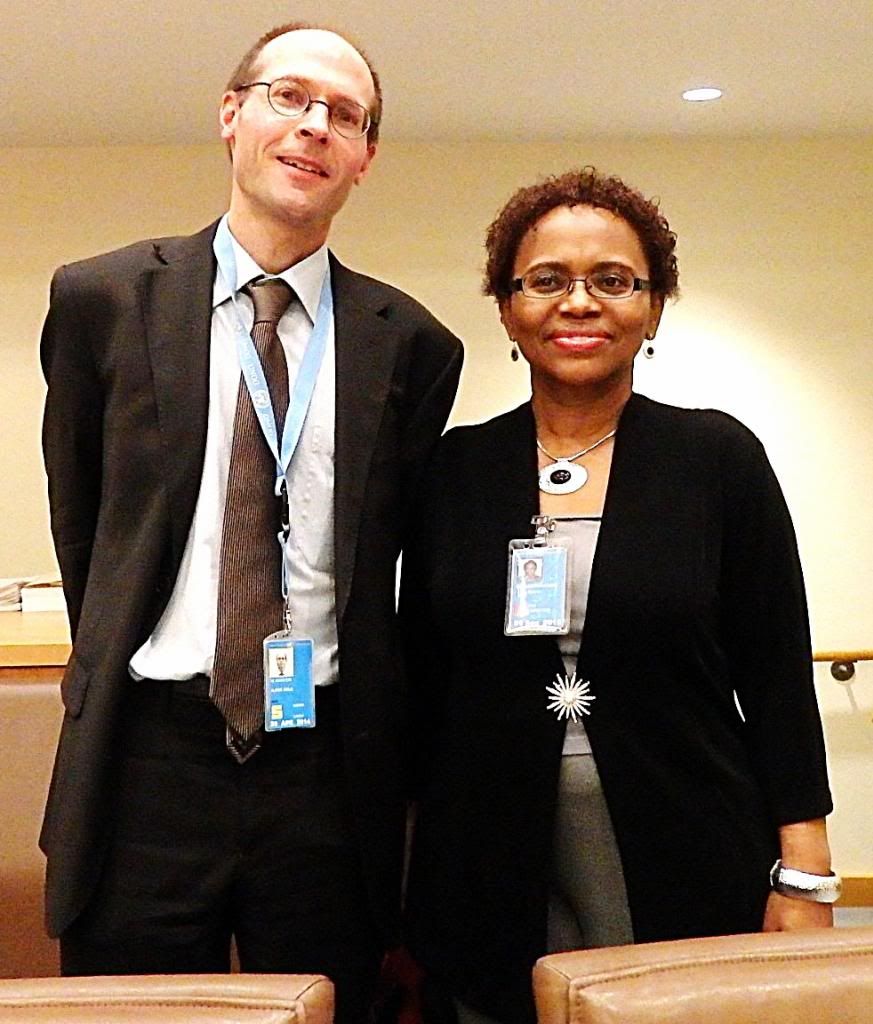Right to Food, General Assembly's 3rd Committee
25/10/2013

Olivier De Schutter, UN Special Rapporteur on the Right to Food, with Ms. Brennen-Haylock.
Ladies and Gentlemen,
With the overarching objective of ensuring humanity’s freedom from hunger, FAO works in partnership with other stakeholders in support of country-led processes towards ensuring food security and nutrition for all human beings.
FAO has reviewed its Strategic Framework 2010-19 to emphasize rights-based approaches.
The first key outcome of this process is the realization by Members of the need to commit the Organization to the eradication of hunger, by elevation of FAO’s first Global Goal from reducing to eradicating hunger, food insecurity and malnutrition as recommended by FAO’s Council. Member Countries endorsed the new strategic framework at the Thirty-eight Session of FAO’s Conference (Rome, June 2013).
The progressive realization of the right to adequate food has been part of the corporate commitments of FAO and the vision of the Committee on World Food Security (CFS). Reformed in 2009, CFS provides inclusive international platform for a broad range of stakeholders, including governments, intergovernmental organizations, civil society and research institutions, producers and private sector organizations, to work together with a view to promoting greater policy convergence and coordination and supporting the implementation of nationally and regionally owned plans of action for the elimination of hunger.
In 2004, a CFS led process culminated in the adoption by the FAO Council of the Voluntary Guidelines to Support the Progressive Realization of the Right to Adequate Food in the Context of National Food Security (VGRtF), which lays down practical actions that states and other stakeholders can take in order to move towards the realization of the right to adequate food.
Since then, the VGRtF have contributed to various processes at the national as well as international levels. They have offered guidance to the development and strengthening of national and regional legal, institutional, policy and strategic frameworks and monitoring mechanisms relating to food security and nutrition.
They have also been used for advocacy, information and capacity development in support of more effective and better targeted measures in the area of food security and nutrition. FAO has collaborated with a range of relevant stakeholders, including the UN Special Rapporteur on the right to food and the UN Office of High Commissioner for Human Rights, in promoting and supporting the implementation of the VGRtF.
The VGRtF has influenced the international debate in the area of food security and nutrition as well as closely linked areas such as land tenure and agricultural investment, especially in the context of CFS led processes.
The Voluntary Guidelines on the Responsible Governance of Tenure of Land, Fisheries and Forests in the Context of National Food Security that was adopted by CFS in 2012 provides guidance to improve the governance of tenure towards achieving food security for all, based on human rights and good governance principles and support to the progressive realization of the right to adequate food in the context of national food security.
In the same year, the CFS adopted the Global Strategic Framework for Food Security and Nutrition, which is meant to improve coordination and guide synchronized action among a wide range of stakeholders at global, regional and national levels, inter alia, to implement the VGRtF by promoting policy coherence and providing practical guidance on core recommendations for food security and nutrition strategies, policies and actions.
It proposes using human rights based approach to the development, implementation and monitoring of policies and programs related to food security and nutrition at all levels. The CFS further launched an inclusive consultation process for the development of principles for responsible agricultural investment that enhance food security and nutrition and support the progressive realization of the right to adequate food in the context of national food security.
The VGRtF has affected the above and other national and international processes.
At its 39th session, the CFS agreed to include a session on a ten year retrospective on progress made in implementing the Guidelines in its 41st Session in 2014. This will provide an opportunity to document good practices, identify challenges and share experiences in the implementation of the Guidelines.
FAO and its partners may use the outcome to improve knowledge and support states in evidence-based decision making. The review can catalyze processes for better implementation of the VGRtF. This will be reinforced by the dissemination of CFS decisions and the periodic assessments of CFS’s effectiveness in improving policy frameworks that was envisaged at the CFS 40 in October 2013.
FAO looks forward to continued collaboration with the 3rd Committee.
Thank you.
